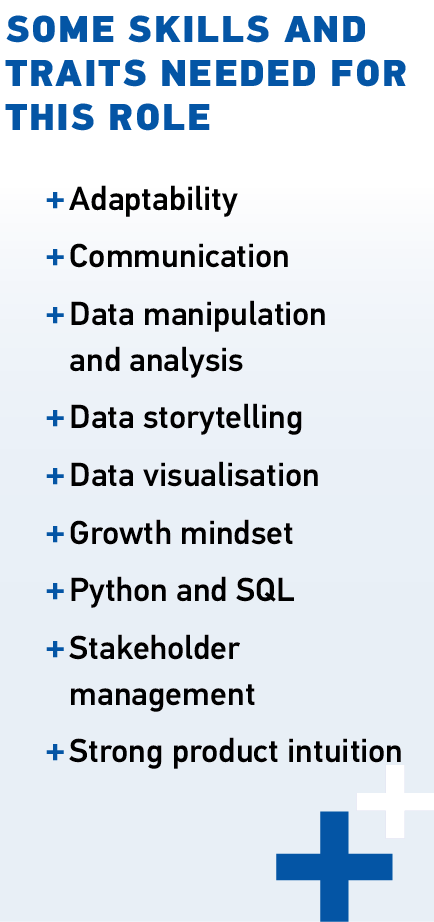

TELL US ABOUT YOUR ROLE AND MAIN RESPONSIBILITIES.
I currently serve as a Product Analyst at Tamara, a leading FinTech firm in the Gulf Cooperation Council (GCC) region. My primary responsibility is to leverage data-driven insights to support strategic decision-making within the business and product teams. Specifically, I focus on optimising the checkout process to enhance customer conversion rates by reducing friction throughout the user journey.
My role involves designing key metrics, developing dashboards, conducting in-depth analyses, and collaborating closely with engineering teams to ensure accurate data tracking. A significant part of my work also involves communicating analytical findings and presenting actionable insights to non-technical stakeholders.
WHAT MADE YOU PURSUE A CAREER IN THIS SECTOR?
As a computer engineering graduate, I had a wide range of career paths to consider, from software engineering and robotics to roles in data science and analytics. Among these options, the role of a data analyst stood out to me. It offers me the opportunity to collaborate closely with business teams while engaging in hands-on technical work. I am motivated by the tangible impact of solving business challenges and find great satisfaction in tackling technical tasks.
Through multiple internships across various industries, I discovered that data analytics perfectly aligns with my skills and interests. It was a journey of exploration through trial and error, and experience that guided me to confidently pursue this career path.
WHAT DO YOU ENJOY MOST ABOUT THIS ROLE?
As an outgoing person, one of the most fulfilling aspects of my role is the opportunity to build strong connections with stakeholders and collaborate closely with my team. I enjoy sharing the significance of metrics and fostering a sense of ownership of our projects and initiatives. Working together to achieve common goals and witnessing the collective impact of our efforts is incredibly rewarding to me.
WHAT WERE SOME WORK CHALLENGES YOU FACED AND HOW DID YOU OVERCOME THEM?
As a relatively inexperienced data analyst, I faced the challenge of producing meaningful insights and developing metrics that met the expectations of non-technical stakeholders. The pressure to deliver actionable results quickly was daunting, especially knowing that these insights would influence strategic decisions. Seeking guidance from mentors and collaborating closely with experienced analysts proved invaluable. Their support and expertise helped me gain confidence in interpreting data and presenting findings effectively to stakeholders. Over time, I learned to leverage these experiences to enhance my analytical skills and navigate challenges with greater assurance and competence.
WHAT IS NEEDED TO BE SUCCESSFUL IN THIS ROLE?
To excel as a data analyst, a combination of technical skills and interpersonal qualities is essential. Proficiency in data manipulation and querying using tools like Python and SQL are fundamental. Equally important are soft skills such as stakeholder management, developing a strong product intuition, effective communication, and the ability to craft compelling narratives from data.
A growth mindset is crucial for continuous learning and adaptation in a dynamic field where new challenges arise daily. I found it particularly beneficial to regularly engage with peers to understand diverse approaches to solving business problems. This practice expands perspectives and enriches problem-solving strategies.
SHARE YOUR ADVICE WITH STUDENTS WHO ARE KEEN TO PURSUE A CAREER IN YOUR FIELD.
My advice to students aspiring to enter the field of data analytics is to focus on building a solid foundation in both technical skills and soft skills. Start by mastering programming languages like Python and SQL for data manipulation and analysis. Additionally, develop proficiency in data visualisation and dashboarding tools such as Apache Superset, Tableau, and PowerBI.
Interning at various companies is one of the best ways to acquire practical skills that will be relevant for an early career. Equally important are soft skills such as effective communication, stakeholder management, and the ability to translate technical insights into actionable business recommendations.
Lastly, I encourage students to stay curious and adaptable. The field of data analytics evolves rapidly, so maintaining a growth mindset and continuously updating your skills will help you stand out in this competitive industry.






